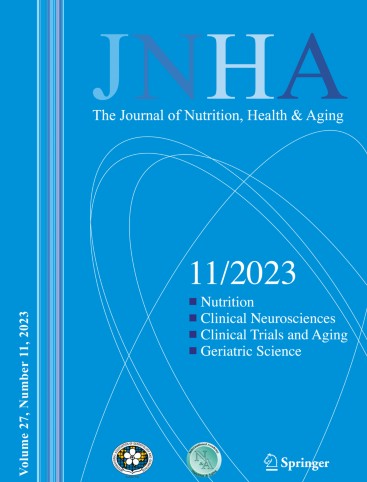身体虚弱、社会缺陷和认知障碍与45种非传染性疾病风险的关联:加速生物衰老的中介作用——一项前瞻性队列研究
IF 4
3区 医学
Q1 GERIATRICS & GERONTOLOGY
引用次数: 0
摘要
目的虚弱超越了身体结构,包括认知和社会功能。我们的目的是评估这些损伤与45种非传染性疾病(NCDs)风险的单独和联合关联,并探索加速生物衰老的作用。设计和设置一项前瞻性队列研究使用了英国生物银行的数据。共有427,026名参与者的身体数据,171,269名参与者的社会数据和49,820名参与者的认知数据被纳入分析。测量使用自我报告数据和人体测量测量来评估身体虚弱、社交缺陷和认知障碍,而生物年龄则根据血液化学和临床数据计算。计算风险比(hr)和人群归因分数以评估其与非传染性疾病风险的关联。通过中介分析,研究了加速生物老化在这些关联中的作用。结果身体虚弱、高社交缺陷和认知障碍分别与27例、17例和7例非传染性疾病风险增加相关(HR > 1, p校正<;0.05)。身体前虚弱和中度社会缺陷也与许多非传染性疾病风险有关。与单域损伤者相比,多域损伤者发生非传染性疾病的风险更高(P < 0.05)。此外,身体虚弱和高社会缺陷对年轻个体(60岁)和女性的ncd有更大的影响(Pinteraction<0.05)。这些功能损伤加速了生物老化(Ptrend<0.05),中介分析显示,生物老化加速解释了它们与非传染性疾病的3.205%-50.296%的关联。身体、社会和认知功能的损害与许多非传染性疾病的风险增加有关,加速的生物衰老在一定程度上介导了这些关联,强调了系统评估虚弱和生物衰老以及实施干预措施以预防非传染性疾病的重要性。本文章由计算机程序翻译,如有差异,请以英文原文为准。
Associations of Physical Frailty, Social Deficits, and Cognitive Impairment with Risk of 45 Incident Non-Communicable Diseases: The Mediating Role of Accelerated Biological Aging—A Prospective Cohort Study
Objectives
Frailty extends beyond a physical construct to encompass cognitive and social functioning. We aimed to assess the associations of these impairments, individually and in combination, with the risk of 45 non-communicable diseases (NCDs), and explore the role of accelerated biological aging.
Design and setting
A prospective cohort study was conducted using data from the UK Biobank.
Participants
A total of 427,026 participants with physical data, 171,269 with social data, and 49,820 with cognitive data were included in analysis.
Measurements
Physical frailty, social deficits, and cognitive impairment were assessed using self-reported data and anthropometric measurements, while biological age was calculated based on blood chemistry and clinical data. Hazard ratios (HRs) and population attributable fractions were calculated to assess their associations with NCDs risk. The role of accelerated biological aging in these associations were investigated by mediation analysis.
Results
Physical frailty, high social deficits, and cognitive impairment were associated with an increased risk of 27, 17, and 7 NCDs, respectively (HR > 1, Padjusted<0.05). Pre-physical frailty and moderate-social deficits were also associated with numerous NCDs risk. Compared to participants with single impairment, those with impairment in multiple domains had a higher risk of NCDs (P < 0.05). In addition, physical frailty and high social deficits had a greater impact on NCDs in younger individuals (<60 years old) and females (Pinteraction<0.05). These function impairments accelerated biological aging (Ptrend<0.05), and mediation analysis revealed that accelerated biological aging explained 3.205%–50.296% of their associations with NCDs.
Conclusions
Impairments in physical, social, and cognitive functions were associated with an increased risk of numerous NCDs, with accelerated biological aging partially mediating these associations, highlighting the importance of systematically assessing frailty and biological aging and implementing interventions to prevent NCDs.
求助全文
通过发布文献求助,成功后即可免费获取论文全文。
去求助
来源期刊
CiteScore
7.80
自引率
3.40%
发文量
136
审稿时长
4-8 weeks
期刊介绍:
There is increasing scientific and clinical interest in the interactions of nutrition and health as part of the aging process. This interest is due to the important role that nutrition plays throughout the life span. This role affects the growth and development of the body during childhood, affects the risk of acute and chronic diseases, the maintenance of physiological processes and the biological process of aging. A major aim of "The Journal of Nutrition, Health & Aging" is to contribute to the improvement of knowledge regarding the relationships between nutrition and the aging process from birth to old age.

 求助内容:
求助内容: 应助结果提醒方式:
应助结果提醒方式:


